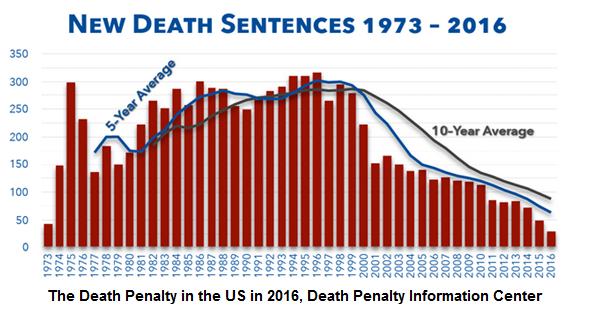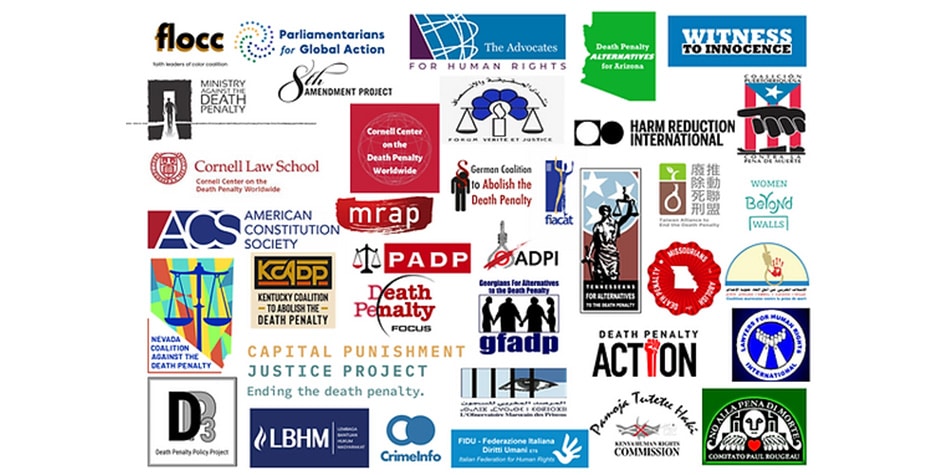
A new decline in the use of the death penalty in the US in 2016
Statistics
Around 30 death sentences have been pronounced in 2016, i.e. 39% less than the year before and the fewest since 1972 – the year the Supreme Court declared the death penalty statutes unconstitutional. For the sixth year in a row, less than 100 people have been convicted to death.
The number of counties pronouncing death penalty has been halved in the last four years, from 60 in 2012 to 27 in 2016. Moreover, no State imposed more than 10 death sentences this year – unprecedented in 40 years.
20 people were executed in the US, in comparison with 28 in 2015.
Local reports confirm this decline: the Missourians for Alternatives to the Death Penalty have noticed a significant decline of executions (6 in 2015, 1 in 2016), while the Texas Coalition to Abolish the Death Penalty’s review underlines that the State of Texas has executed seven people in 2016, the lowest number of executions in two decades.
Measures taken by the American pharmaceutical industry to prevent the use of their medicines for the purpose of executions, European Union’s regulations to prevent the export of materials which could be used for conducting executions as well as a Court order preventing the illegal importation of execution drugs have played a role in this decline.
Besides, the death penalty statutes in Florida and Delaware have been declared unconstitutional by state courts.
A survey released by the Pew Research Center also revealed that the support for the death penalty declined sharply since the 1990’s, with a minority of US-citizens (49%) still favouring it today. Also reporting a historic decrease in the support for the capital punishment, Gallup however found that 60% of US-citizens still supported the death penalty. Local polls in Florida, Louisiana, Oklahoma, Houston and Kentucky revealed that a majority would prefer prison sentences over the death penalty as punishment.
The 2016 elections: a setback for the abolitionist cause
Despite the progress achieved, the 2016 elections did not turn out in favour of the abolitionist cause. In three States where the voters could decide on death penalty issues, they chose to retain (California, Oklahoma) or to restore (Nebraska) capital punishment.
Speedy Rice, from Death Penalty Focus, explains “why the California vote matters” and recalls that California has the largest death row in the US, with 749 prisoners. While the abolition of the death penalty in this State “would have been a very powerful statement for abolition […], 7,218,625 California citizens voted against ending the death penalty and most of those people voted to speed up executions – 6,626,159.” He adds that “even with the DPIC report showing few counties in California imposing the death penalty, the voter totals demonstrate continuing support for the death penalty and no end for the foreseeable eight years to twelve years.”
Speedy Rice also underlines the impact of the election of D. Trump to the US Presidency: “Total abolition in the US will have to come from the US Supreme Court declaring the use of the death penalty cruel and unusual punishment under the Eighth Amendment to the US Constitution.” Currently, four justices out of nine favour the abolition of the death penalty. A five-justice majority is however needed to reach such a decision, and “Trump’s first appointment will certainly be a pro-death justice.”
Finally, Speedy Rice fears “an increase in federal death penalty prosecutions and a push to renew federal executions”: “While the past federal death penalty statistics optimistically relied on in the DPIC report are accurate, there is no reason to believe that limited use of the federal death penalty will continue under the Trump administration”.







